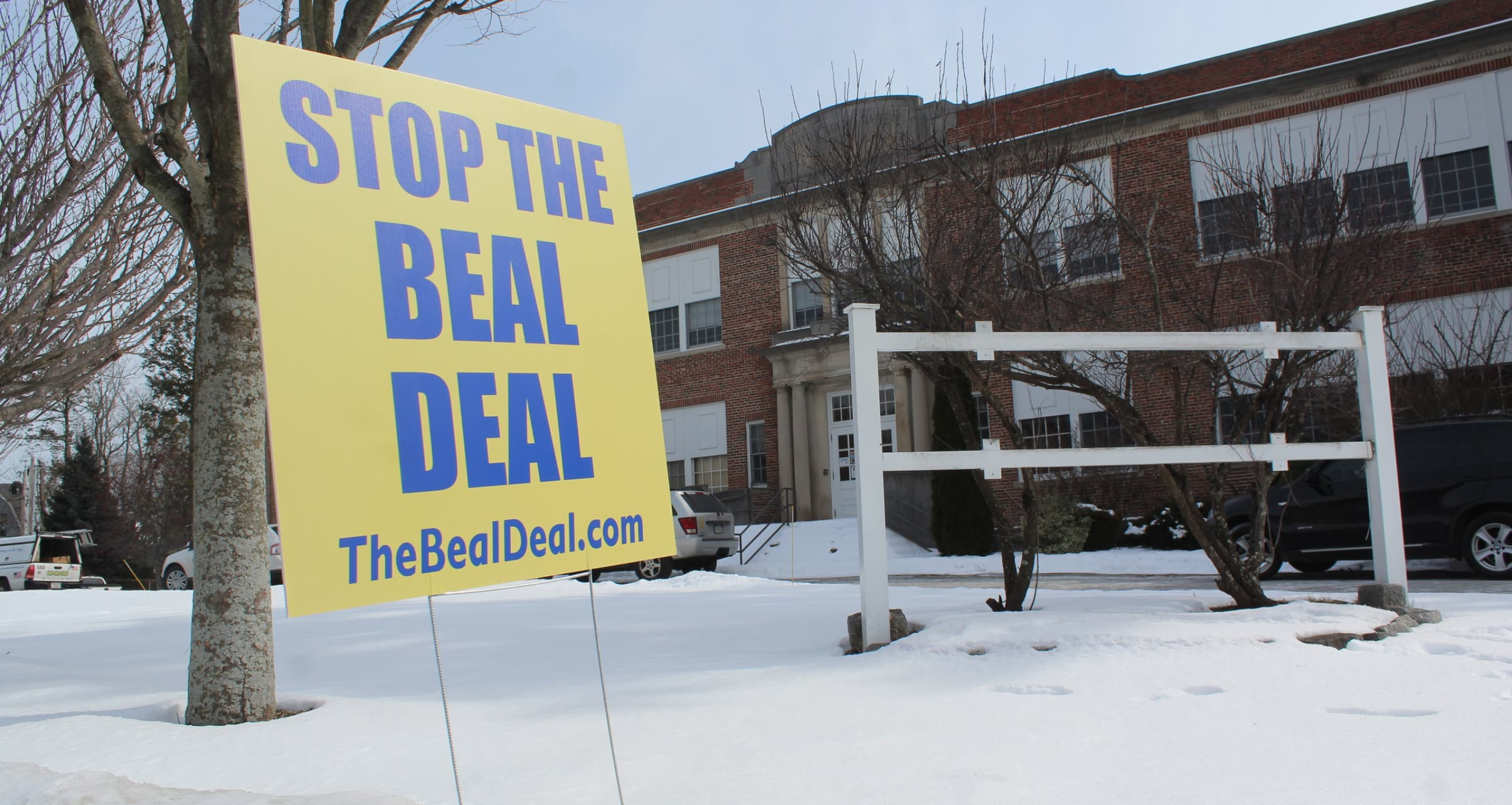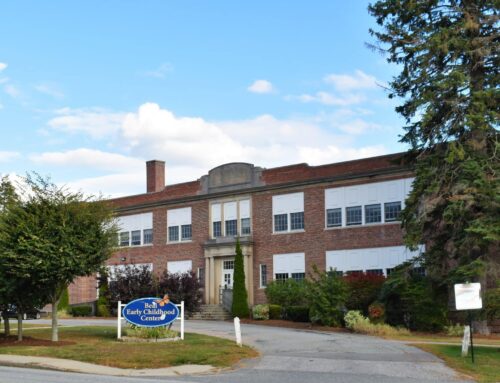By Laura Hayes | March 8, 2022
The following article was published in the Community Advocate on March 8, 2022. View the full article here.
UPDATE: This article has been updated to include additional comments made by Board of Selectmen Chair John Samia and Town Manager Kevin Mizikar.
SHREWSBURY – A group of Shrewsbury residents are asking their selectmen to “stop the Beal deal.”
Proposed as a mixed-use redevelopment of the century-old Beal school site in the downtown area, this project has prompted debate in Shrewsbury.
Recently, residents were collecting signatures for a petition to halt negotiations with developers, noting concerns about transparency in the process so far.
“We have select people who do not deserve to have the residents’ support any longer,” said organizer Paul Zekos in an interview with the Community Advocate on March 5. “Never ever have I ever been so disappointed in this community.”
“I’ve been here all my life,” he continued. “I’ve been committed to public service myself. We need to work collaboratively to create a better plan, to be a better steward of the community and ensure that we maintain this site for generations to come.”
As Zekos has raised concerns, though, town leaders have defended the process, noting its various steps, like visioning sessions, and a move by Town Meeting in 2020 to transfer the property to the selectmen for the purpose of selling it.
Town Manager Kevin Mizikar said one of the challenges in the public sector is to receive community engagement.
It can be “hard” to get people to engage in visioning sessions when there may not be anything tangible to grab onto, he told the Community Advocate on Monday.
He said he understood that, as projects evolve and become more tangible, residents may have more feelings.
“That’s this last phase of this comprehensive project that we’re going through right now,” Mizikar said. “It truly is where the rubber starts to meet the road, but it’s why we always encourage people to come out through the whole project because you can have the greatest influence early on in the project when it’s more of a blank canvas than what we’re dealing with today.”
Residents oppose Beal plan
Residents gathered in front of the Beal school and on the Shrewsbury Town Common on March 5, holding signs opposing the project and gathering petition signatures.
The developers, Civico Greenly, had presented plans for 8,000 square feet of retail space and 65 apartments during past public meetings.
Resident Joan Hare called the parking in the area “abominable.” She said traffic in the area is “unmanageable,” and she worried that the school system could face a burden if families with children move in.
Julie Ross, who lives close to the old Beal school, is part of a group of neighbors advocating to preserve an existing park on the property.
“It’s just such a shame,” Ross said. “While they profess to be so children friendly, one of the few working-class neighborhoods with affordable housing that has a resource that people can use and they’re just taking it away.”
New residential units aren’t needed in town, she said, pointing out other housing projects like the Edgemere Crossing development along Route 20.
Zekos said he had been watching the public hearing regarding Beal back in December via a livestream. Once he believed he understood what the selectmen were supporting, he said, he drove to the hearing to share his thoughts.
“I was shocked at the magnitude of the proposal as well as the use and the fact that the town was grossly underselling one of its cherished assets,” Zekos said.
It appeared that the selectmen had made up their mind, he said.
“When we had the opportunity to talk at that public hearing, the board was particularly defensive and was advocating for the development company as opposed to advocating for the residents,” Zekos said. “I think that really exacerbated my concern about the direction in which that was heading.”
He said he reached out to the selectmen several times following that hearing, sharing examples of work in other communities and suggesting that the town seek other options while reevaluating its plan.
He said people are unaware of the project and reiterated concerns about opportunities for input.
“Every single resident of this town owns a little piece of that four acres,” Zekos said of Beal. “Every single resident owns a brick in that school.”
“It is not at all unrealistic for the people of this community, whose heart and soul is in this town, who are as passionate as me about Shrewsbury being a great community…to expect that the selectmen proceed with another public hearing, justify their decisions, listen to other options and concerns and reevaluate their course of action,” he continued. “They owe that to the people.”
Board of Selectmen Chair John Samia said they respect residents’ rights to demonstrate and reflect their beliefs.
He noted that public hearing on the project on Dec. 7 that Zekos attended. The selectmen have read every letter since then, while also receiving emails and phone calls, Samia said. Although he said he could only speak for himself, Samia said he has been “happy” to discuss this project and process.
“We’ve been ready, willing and able to talk to any resident about this,” Samia said.
Project history
Mizikar said revitalization of the Town Center was a “key component” of the town’s 2016 master plan.
“Throughout each one of those major aspects of the project, we solicited public feedback,” Mizikar said.
He remembered a visioning session that was held in the Shrewsbury Public Library over three nights.
“That really set the vision,” Mizikar said. “It defined the desired future state for this property.”
The town got the green light in 2017 to build its new Beal Elementary School on Lake Street. A Beal Reuse Committee was subsequently formed to study the future of the old school property, which Mizikar noted also held public hearings and meetings.
Samia said that led to the 2020 Town Meeting where there were articles that ultimately established the new Town Center zoning district and transferred the Beal property to the selectmen for the purpose of making the property available for sale “for no less than $1.” That vote also authorized them to enter into any agreements.
“Town Meeting was saying, ‘We understand the materials that are provided, and we trust the board within these parameters to sell this property,’” Samia said.
In May of last year, Civico Greenly, which was the only developer to respond to the town’s request for proposals to redevelop the school, laid out its plans for the site. The developers have been in negotiations with the town since then.
The selectmen have met in executive session under a portion of state Open Meeting Law that allows such meetings for purposes of considering the purchase, exchange, leader or value of real property if an open meeting may have a detrimental effect on a negotiating position.
“The gist of it’s this — you’re selling property,” Samia said. “You have strategy, and what if you were to say, ‘I’m willing to sell that parcel for $100.’ But you have the buyer there, right in front of you, and you’re talking to your team and say, ‘I’d really take $50.’ That wouldn’t go very well.”
Town leaders have said the project would be a catalyst for future investment and development downtown.
Assistant Town Manager Kristen Las specifically estimated during the hearing that the project would add $23 million in initial investment in the area and generate an annual revenue between $150,000 to $200,000, not including revenue from motor vehicle excise tax or meal tax.
Mizikar said in the hearing that the town plans to sell the building to Civico Greenly for $250,000.
In January, the selectmen gave Mizikar formal approval to begin negotiations with Civico Greenly and asked him to take residents’ concerns into consideration as part of the process — specifically to lower the number of units, increasing the amount of available green space and maximizing parking available to the Town Center as a whole.
The land disposition agreement will take those into consideration, Mizikar said.
A land disposition agreement, he said, is a precursor to a purchase and sale agreement.
It establishes the terms of a future real estate transaction and a deadline for their due diligence, gives the developer grounds to understand what will take place during the permitting process and defines types of deposits to hold the developer’s exclusive right to the property, Mizikar said.
The selectmen are expected to review and act on a land disposition agreement with Civico Greenly during their meeting tonight.
Next steps
Approval of that agreement will start a “traditional permitting process for a project,” Mizikar said.
For the developer, this means they can invest more resources into the project to mature their plans, meet with staff, and formally apply with town boards, like the Planning Board, Mizikar said.
He emphasized that there will be public hearings throughout the Planning Board process.
“So, individuals would have the opportunity to really discuss the details of the project,” Mizikar said.


